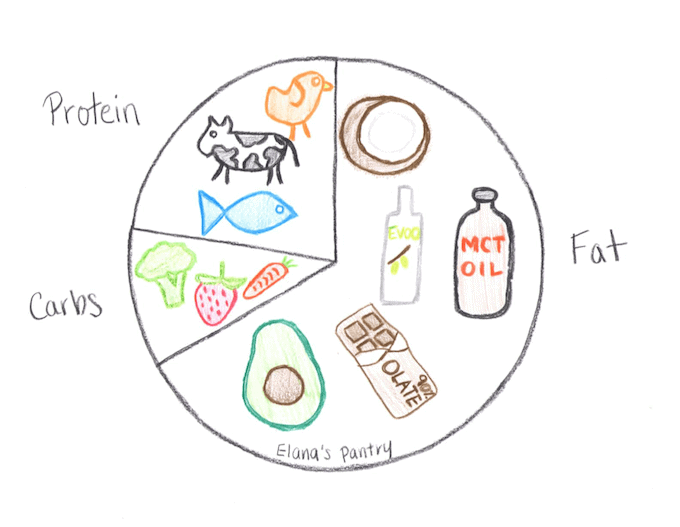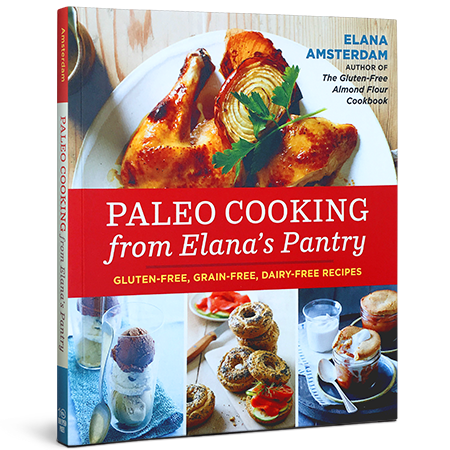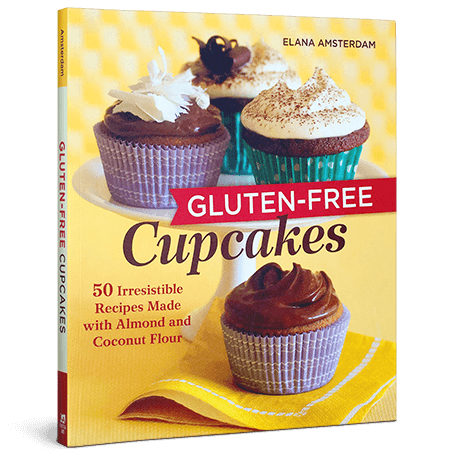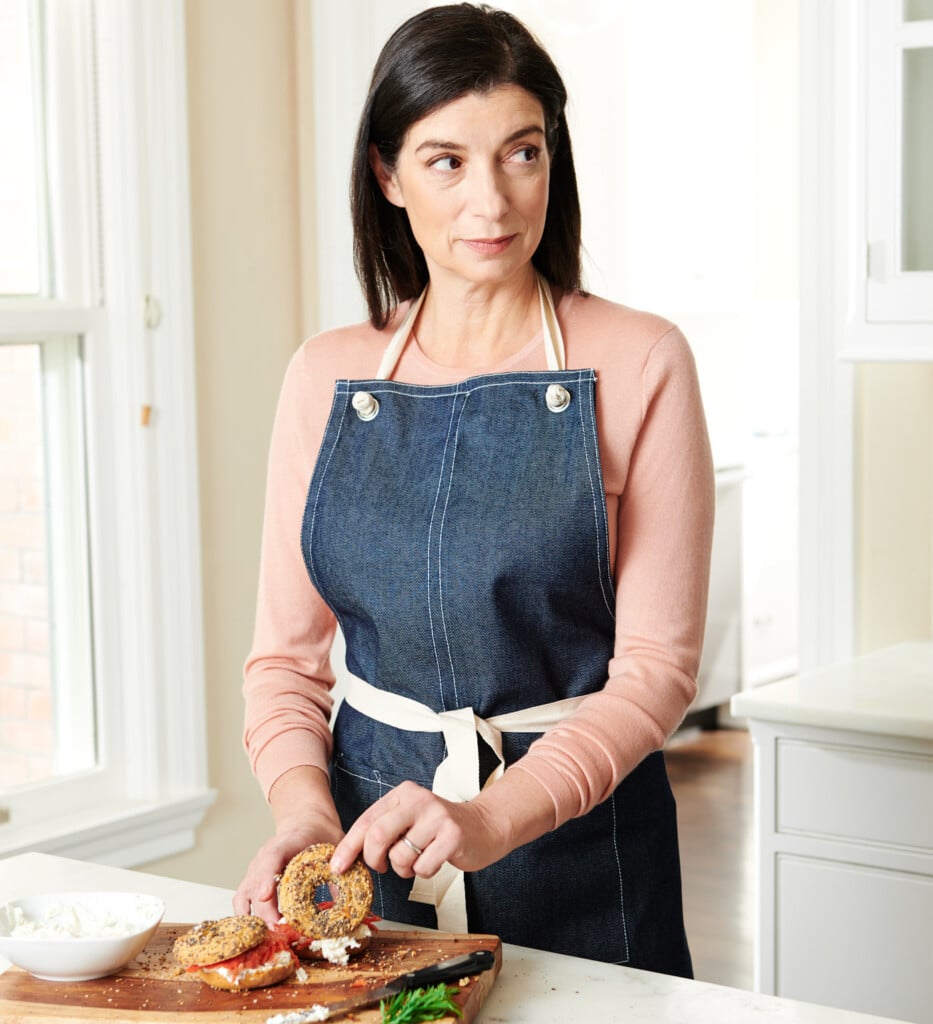The other day I ran into a reader at the grocery store who thanked me profusely for my recipes. She said they were easy to throw together, used healthy ingredients, and regularly turned out well, pleasing her guests every time! I was beyond humbled as the conversation continued, given my goal to serve others and make their lives as easy as possible with my recipes and health tips!
As we continued to chat, she thanked me for putting together my Keto Diet Recipes page and said that she had just started the keto diet. We talked a bit about what she was eating, and she said mostly a lot of chicken. As our conversation continued I let her know that it would be important to add more fat to her diet if she wanted to go into ketosis.
Although there is evidence that points to the use of the ketogenic diet since Greco-Roman times, there are many misconceptions surrounding it. That’s why I’m providing this critical information. To help you understand that the keto diet is a high-fat diet, and refute the somewhat common misconception that the keto diet is a high-protein diet, because it’s not.
Classic Keto Diet
The classic keto diet is a diet that has twice as much fat as protein and carbohydrates combined. That’s right. In terms of macro-nutrients, a classic keto meal could have somewhere around 60 grams of fat, 20 grams of protein and 10 grams of carbs. I did follow that type of keto diet for a while, though I altered it so that instead of 2:1 classic keto, it was 1.5:1. I did not enjoy weighing everything, especially my kale and broccoli, so I stopped. I made up my own version which was more intuitive and did not include weighing food and tracking my macro-nutrient consumption.
High Protein Diets
As I mentioned, the keto diet is not a high-protein diet. So the reader that I ran into in the grocery store who was eating a lot of chicken had made a critical error. Though she had removed grains and sweets and her new diet was quite an improvement over her previous vegetarian diet, it was not going to get her into a state of ketosis.
Can you eat too much protein on the keto diet? The answer is yes. What happens if you do so? That protein will be converted to glucose by the body.

Free exclusive eBook, plus recipes and health tips, delivered to your inbox.
Gluconeogenesis
What is gluconeogenesis? It is a metabolic process that takes place in your body when you eat too much protein on the keto diet, or any diet. An excess of protein is turned into sugar and stored as fat in your body. Making glucose from non-carbohydrate substrates is not a good thing when your goal is ketosis. Gluconeogenesis is the opposite of glycolysis which is the extraction of energy from carbohydrates.
We don’t want either of these processes on the keto diet. We want to get our primary energy source to come from fat on this diet, which is converted into ketone bodies.
What is the Keto Diet?
The ketogenic diet is a high-fat diet. Most of your calories will come from fat on a keto diet, while you consume moderate amounts of protein and very low amounts of carbohydrates. The consumption of macro-nutrients in this ratio allow the body to become metabolically flexible and burn fat rather than carbohydrates.
In essence, the human body is like a hybrid vehicle. It relies on starches or fats for energy. Unfortunately, for the most part, it cannot utilize both fuels at the same time. You are primarily either a carbohydrate burner or a fat burner. By consuming a large amount of fat, the body becomes accustomed to, and efficient at, burning fat, therefore tapping into hundreds of thousands of calories of stored fat that were essentially trapped by carbohydrate metabolism.
The Low-Carb Diet is Not a Keto Diet
Low-carb diets are fantastic. Those eating the Standard American Diet are consuming far too many carbohydrates, and eliminating extra carbohydrates from unhealthy sources is great. However, reducing carbs is not enough to get your body into ketosis. To do that, you must add fat. That doesn’t mean you have to eat a lot of butter or heavy cream, though those fats will get you into ketosis if you eliminate carbohydrates.
It means you will need to supplement your diet with some sort of fat. That could be MCT oil, or it might be coconut oil. Whatever it is, remember, you need to eat around 2 times as much fat as protein and carbohydrates combined to go into ketosis. So if you are going to go for the classic 2:1 keto diet, and eat kale chips, you would want to dip them in olive oil, which is another good source of fat on the keto diet.
The Keto Diet is a Low-Carb Diet
If you do wish to count your carbs on a keto diet you will find that many people like to keep them under 50 grams per day, some folks that are very strict keep carbohydrates under 20 grams per day while following a keto diet. Remember though, that while a low-carb diet is not necessarily ketogenic, a keto diet must be low in carbohydrates. Eating too many carbohydrates will throw your body right out of ketosis or prevent you from going into it.
How Many Carbs to Consume on the Keto Diet?
Everyone is different. We are all bio-chemical individuals with different metabolisms and varying needs for energy and calories. Personally, I do not want to count my carbs for several reasons. First, if I exercise more one day, I will likely be hungrier than if I am sedentary. My caloric needs will shift and I will be able to increase carb consumption a bit and stay in ketosis, though I could supplement calories with protein or fat instead.
Further, I do not want to restrict good carbohydrates. Everything is a trade, and I’m willing to kick myself out of ketosis if I want to eat more salad, kale, or other green vegetables, as I find the benefits of those nutrients are extremely helpful in terms of the array of health issues that I am dealing with.
However, if the keto diet is being used to treat a child with epilepsy and it is critical to keep the child off of drugs, seizure-free, and in a state of ketosis then counting carbs is a must!
I hope this post helped you to better understand the basics of the ketogenic diet. Stay tuned for a future feature that will teach you how to figure out whether or not you are in ketosis. In the meantime, here are some of my favorite dairy-free keto recipes for you!






dawn says
Hi Elana,
I would love to learn more about your approach to Keto. It seems like their are many different ways to do it/maintain it. I really respect your site and approach to life and so would appreciate to learn more about what/how you do it. So many blogs focus on weight loss benefits but that is not my goal. I just want to live my life optimally. Be happy, control hormones through menopause, think clearly, etc…I have been following a meal plan set up for my age, weight, activity level for 2 weeks now in order to learn how to eat keto and it has been a really difficult transition. I feel I am almost fat adapted but not yet as I do not feel a really clear brain and concentration or high/consistent energy. Can you tell me how long it took you to become fat adapted? Do you stay in ketosis all the time? Do you have carb days or meals? How often? Do you eat 2x per day and fast between or do you snack all day?
Elana says
Hi Dawn, thanks for your comment! I feel so much better when I eat Keto (low-carb high-fat). I do like to add a lot of greens which can kick me out of ketosis, but they are a very important in my diet since I have the MTHFR gene and as a result have impaired detox. I will be writing a good deal in the future about both keto and MTHFR so stay tuned!
Denyse says
Hi Denyse here what fruit can I eat while on Keto Diet
Elana says
Denyse, I would recommend sticking with low-carb fruits like berries :-)
Karen says
Do you find that you can get onto ketosis without tracking your foods? I’ve started my keto diet today and the thought of all this tracking is overwhelming. I have tracked my foods off and on for nearly 30yrs. I am trying to reduce inflammation, I have Rheumatoid Arthritis, Raynards, & Hyperthyroid disease. Thanks! By the way, I love your cookbooks and website. Every recipe I’ve made have turned out fabulous!
Elana says
Karen, I find if I restrict carbs and pile on fat there is no need to weigh everything out that I eat, I easily get into ketosis. Thanks so much for your kind words about my cookbooks and website! I’m so happy to hear that every recipe you’ve made has turned out fabulous :-)
Suzie Wolfer says
Elana you are AWESOME! Thank you for this article and this amazing body of work that is your website, books, comments. Beautiful, delicious, sustainable, creative. I’m smiling
Elana says
Suzie, thanks for your incredible comment, I really appreciate it!
April McLaughlin says
A few questions I hope you’ll be able to answer:
1) How can you tell if your in ketosis?
2) When counting grams of carbs, are you deducting fiber?
3) You said you’ve been eating this way since 2014….I always thought (possibly a misconception) that putting your body into ketosis for too long is dangerous. Can you expound upon that?
I started a ketogenic diet 6 weeks ago because my pH is too low (currently 6.5), or at least I thought I was doing it right. I’ve been at at about a 1:1 ratio, on average….some days higher protein which bring down my fats. Do you have any more links sharing how you increase your fats? My carb count, on average, is right around 30-40 grams with my sugar count around 10 grams.
Appreciate you sharing what you’ve learned because I’m always looking at how I can improve my health.
Elana says
Hi April, thanks for your comment! First, you can tell if you’re in ketosis by doing either blood, breath, or urine tests. Second, yes I count net carbs. Third, I like to be in a very mild ketosis and have not had any problems when doing that. I increase fat by eating more avocados, coconut oil and olive oil :-)
Susan Tremaine says
I am looking forward to your comments regarding how to know if I am in ketosis. Have you posted them yet?
Thank you very much.
Elana says
Susan, I haven’t posted that yet. Stay tuned :-)
Kathy says
Dear Elana.
I have been following the Paleo diet for 5 years now, and have had success at losing weight, and have all 3 of your cookbooks which I enjoy using, but I came across your article on the Keto diet and am curious if this would work out ok for me. I had my gallbladder removed several years ago and I was wondering if all the fats and oils would upset my digestive system? Your advice would be helpful to me. Thank you Kathy
Elana says
Kathy, thanks so much for your comment and for sharing your story! Given that you had your gallbladder removed I would definitely speak with a functional medicine physician prior to embarking on a high-fat diet.